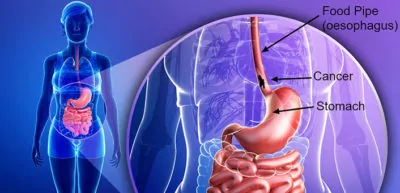
Acid Reflux
GERD & Esophageal Cancer: The Scary, Real Connection
Jul 6, 2017Gastroesophageal reflux disease (GERD), is a chronic condition where acid from the stomach flows back into the esophagus. This is often due to pressure on the lower esophageal sphincter (LES), a muscular valve that guards the opening of the esophagus into the stomach. While it allows food to enter the stomach, it does not allow stomach contents to flow back into the esophagus, unless it has become weakened. Esophageal tissue is not protected from the corrosive action of the acid by the thick mucosal layer that protects stomach tissue. Constant acid reflux, or the backflow of stomach acid into the esophagus, irritates these cells and can lead to cancer.
Symptoms of Esophageal Cancer
Cancer of the esophagus is discovered through a series of symptoms, such as:
- Difficulty swallowing, or dysphagia
- Chest pain
- Weight loss
- Worsening heartburn
- Hoarseness
- Chronic cough
- Vomiting, sometimes containing blood
- Bone pain
- Pneumonia
- Esophageal bleeding, which appears as black stools
Most of us have had at least some of these symptoms, without having esophageal cancer. However, if you have a combination of these symptoms (especially when combined with difficulty in swallowing), it is important to see your doctor.
Types of Esophageal Cancer: Which One Can Be Caused By GERD
Esophageal cancer is extremely aggressive, often fatal, and ranks sixth among cancers in mortality. While the number of people suffering from this condition has been steadily increasing, unfortunately, it is poorly understood and not studied enough.
There are two types of esophageal cancers
- Squamous cell carcinoma and
- Adenocarcinoma.
Squamous cell carcinoma
Squamous cell carcinoma affects the flat cells (squamous epithelium) lining the esophagus. Smoking and heavy drinking increase the risk of this type of cancer. Adenocarcinoma affects the cells that produce and release fluids including mucus, that cover the inner lining of the digestive tract. GERD increases the risks for this type of cancer, and GERD-induced adenocarcinoma has been on the rise in recent years.
Adenocarcinoma Arises from Barrett’s Esophagus: The Crucial Ignored Link To GERD
Barrett’s esophagus is an asymptomatic condition in which the cells of the lower esophagus are transformed into cells that are similar to those found in the intestinal tract. This poorly understood transformation is associated with chronic acid reflux over many years.
One study on rats, with experimentally induced chronic reflux, hinted at a new mechanism in the development of Barrett’s esophagus. Cytokines are small proteins that stimulate the mobilization of cells in the immune system. In an irritated esophagus, cytokines can cause a change in the structure and proliferation of cells and attract more inflammatory immune cells to the area. Thus, the inflammation of the esophagus (esophagitis) could be due to cytokines secreted by squamous cells in response to contact with stomach acid, rather than the caustic effects of the acid itself, as had been previously thought.
Barrett’s esophagus can occur for a variety of reasons but GERD increases the chances of developing this condition by 3 to 5 times. Between 5 and 10 percent of people with GERD develop Barrett’s esophagus, with men twice as likely as women to do so. The condition usually develops after the age of 55.
Adenocarcinomas usually start at the end of the esophagus closest to the stomach, which makes sense since this is the area that is most exposed to the acid reflux sloshing back acidic contents of the stomach.
Patients with Barrett’s esophagus have a 50 to 100 times greater risk of developing esophageal cancer than the general population.
Why You Must Screen For Barret’s If You Have GERD
People who have GERD for many years should be screened by endoscopy for Barrett’s esophagus. Endoscopy involves the insertion of a thin, flexible tube with a camera on its tip, into the mouth. The tube is swallowed, so that the entire esophagus, right up to the beginning of the stomach can be seen by the doctor. Barrett’s esophagus appears on the endoscope as salmon pink colored patches within a whitish pink tissue.
There is no cure for Barrett’s esophagus, and the risk of cancer associated with it cannot be decreased. Therefore, it is important to treat GERD so that Barrett’s esophagus does not develop in the first place.
Once esophageal cancer develops, conventional treatment is limited to radiation and chemotherapy. Unfortunately, due to its aggressive nature, the prognosis isn’t good. According to the American Cancer Society, 5-year survival rates range between 40% and 4%, depending on the stage at which it is detected.
Conclusion
GERD is more than a simple heartburn. That it can cause a disease as frightening and life threatening as cancer is proof of it. Esophageal cancer is aggressive and lethal. You can, however, treat GERD and therefore minimize the risks of esophageal cancer. GERD is a digestive imbalance and can be controlled through a combination of dietary and lifestyle modifications, as well as effective medications.
References:
https://jamanetwork.com/journals/jama/fullarticle/194842





